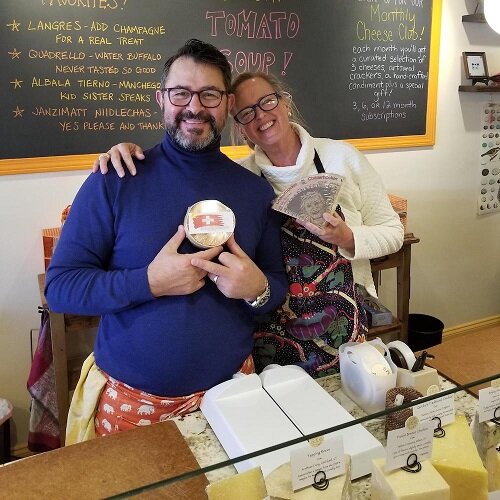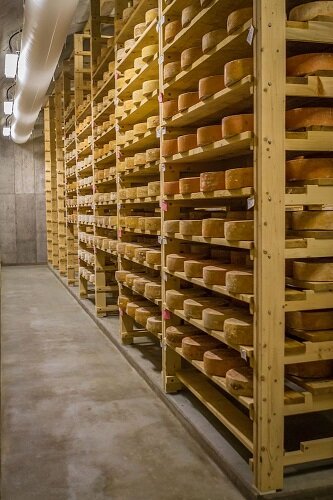How To Become A Certified Cheese Professional®
Gayle & Michael
Have you ever wondered about the Certified Cheese Professional® or CCP™ designation? We reached out to Gayle Martin to learn more about the process of getting certified. Martin is one of about 1,000 Certified Cheese Professionals® in the world. She and her wine importer-husband, Michael Riahi, have owned Plum Plums Cheese in the New York suburb of Pound Ridge (named after a line in the movie, "The English Patient”) since 2014 where they offer 60-70 farmstead, handmade, domestic, and international cheeses, along with truly killer grilled cheese and a host of gourmet items and stylish accessories.
The American Cheese Society Certification
The ACS is a non-profit trade group that promotes the artisan and specialty cheese industry, through education, networking, and encouraging the highest standards of cheesemaking focused on safety and sustainability. Certification is meant to encourage improved standards of comprehensive cheese knowledge and service. The CCP exam was originally developed over four years by a committee of experts. Scores are never revealed; takers simply receive a pass or fail grade. ACS has a strict policy of not releasing how many people sit for the test or the percentage who pass each year. According to the range of figures provided by the organization's Jane Bauer, up to nearly 2,500 cheese professionals have taken the exam since first offered in 2012.
Test Requirements
Martin earned this rare designation from the American Cheese Society (ACS) in 2017 after passing a three-hour, 150-multiple- choice question exam for which she studied three to six hours a day for six months while working at her store. She was re-certified last year, as required every three years, cataloging the 1,000 compulsory hours of work experience and education or professional development. She plans to take the ACS' sensory exam, which evaluates knowledge and skills in the assessment of cheese, from determining condition and quality to evaluating flavor, body, texture, and appearance, post-COVID.
Test takers are required to have a high school or GED basic education and document 4,000 hours (two years) of paid or unpaid work experience in the cheese profession during the past six years, or 2,000 hours of same and 2,000 hours of any combination of work experience and formal or continuing education or professional development deemed acceptable by the ACS. Applications may be randomly audited for accuracy.
Interview with Gayle Martin, CCP™
What are the benefits for you of being a CCP™?
Gayle Martin (GM): It forced me to learn more than I probably would have if I just stood behind the counter. I'm able to teach my customers, I'm able to understand why if I get a cheese that's different, that's off, why is it off? Is it still good to eat? At the very least, it has forced me to be a better cheesemonger. I know my customers appreciate that I went to that extent, to be as good as I can be. But I was serious.
Why did you decide to become a Certified Cheese Professional®?
GM: When we took over the cheese shop, I had a lot of learning to do. In my mind, the more educated I am, the better I'm able to serve our customers. There are a lot of cheese classes you can take, obviously books and books and books that you can read. But in order to be super focused on the entire spectrum of cheese from the cow to the counter, I wanted to dive deeper into it. The exam is a whole spectrum, so you have to understand the various breeds of animals, the need for herd management and pasture, pasture rotation, all that goes into the end result of the cheese. It's not just about cheese making or the types of cheese. It's all the elements that make cheese. That makes me appreciate each wheel of farmstead cheese I receive because I know the hard work that goes into it.
You have three hours to answer 150 multiple-choice questions. That's a lot of questions in a short period of time.
GM: Those questions range from what is the name of the breed of sheep that goes into making Roquefort, to what's the temperature degree at which pasteurization occurs with milk, to what type of rennet or culture do you use to make this type of cheese, to what is the allowable temperature to store hard or soft cheese? How long can milk or cheese be kept out of the refrigerator? What classifications are a certain type of cheese? How to plate cheese on a platter? What are complementary cheeses?
It's literally the entire gamut of the world of cheese. When you're taking the test, they (ACS) say it's a broad overview, but you have to go deep to be prepared to answer any one of those questions. They just may touch on one question in this area, but you don't know what that question is. You gotta understand that whole area of milk transportation, from the farm to the barn, and all of that. It required the comprehension of everything and brought the process to life. I had learned all those aspects and about all the hands that touch the cheese. For example, because there are so many changes going on in the pasture from one season to another, the guy who's managing the soil and the pastures have to be in communication with the cheesemakers. That affects not just the flavor of the milk, but the components of the milk. The cheesemaker has to know how to tweak his recipe to compensate for more fat, less fat, more of this type of protein, less of that type of protein. It's really fascinating.
The ACS offers 11 domains of information, but how do you know the best way to study for a test like this?
GM: They give you sample questions and resources to read. There are groups like GSI, Northeast Gourmet Foods International. They've got a wonderful mentor there, the Director of Education, and he conducts classes in preparation for the CCP exam. All of that (information) keeps being reiterated and presented in different ways, whether it is a download of the information from the ACS and their key learning modules, or you can take a class. You get information from multiple areas and it all comes together. Cheese, it's all kind of made the same way, but you have to understand all the various components that make it its own, what can change, and what do you look for in all the various stages.
Gayle Martin at Cato Corner Farm in Colchester CT with cheesemaker Mark Gillman
Is it like going from a science to an art, putting it into practice?
GM: Absolutely. That's probably the biggest key learning that I had, that it is such a science. When you think of it as handcrafted, you don't realize how much science goes into cheese making. That was my biggest learning hurdle, getting back into my chemistry, breaking out proteins, and this, that, and the other. Then every cheesemaker, every farm, puts their own artistic touch on it.
Jasper Hill Farm Alpha Vault
How did you study?
GM: I downloaded the whole ACS body of knowledge. I read and re-read. Folks online offered old tests, so I downloaded those. I had my husband testing me. I did a stint at Jasper Hill Farm, their hands-on experience was really, really helpful. That was a four-day program for cheesemongers in preparation for the exam. It was everything, soup to nuts, starting in the classroom talking about the science of cheese, then being out with the herd manager and in the milking barn, the cheese-making room, and then wrapping cheese. That was where I crossed the t's and dotted the i's because hands-on is very different from book learning. It was funny because I kept reading things. I knew I had it in the back of my head, but I was nervous I didn't get it. It wasn't until I went to Jasper Hill and I saw milk curdling, saw what happens. It was interesting, really great. There are huge Facebook communities, of the ACS, the prep work, and just support. It's a really great community.
Take us through the test-taking experience.
GM: I was nervous, for sure. There were a couple more prep classes ahead of the test. A bunch of the cheesemakers in town for the convention were speaking. It was a great way to mingle and meet people. I'd finally whittled down my notes, like a book, and I kept going over and over them. You show up and you're in this huge ballroom, there were several hundred people taking the test. I didn't know anybody else; I was kind of all by myself. You've got the timer and monitors walking up and down the aisles.
You've got a book of a lot of questions (gallows laughter). I went through it once and answered everything I was sure of. Then I went back again, working my way through the ones that I was uncertain of. There were a lot of questions that I thought were subject to personal taste, like which of these cheeses is the fourth-best cheese on this platter? You have to think of why they're asking that, so you have to spend a little bit more time on certain questions. There were some people who submitted their test in like an hour. I remember thinking, 'Okay, well, either they're geniuses, or they just gave up.' Because the majority of us were there. It took me two hours and 45 minutes to get through everything.
I was exhausted. Seriously. I remember calling home, speaking to my husband, and being spent. I had one drink, it went right to my head, and I went right to sleep.
I had told all of my customers that I was flying to Denver to take the test to become a certified professional. Of course, they are like, 'so how did it go? Did you pass?' I was so nervous waiting for the results. I thought, 'my God if I fail, what are my customers gonna think of me?' I thought at the very least, they'll be proud I tried.
Gayle Martin celebrating
How did you celebrate when you learned you passed?
GM: Cheese and Champagne!
Is there anything else you want to share about becoming a CCP?
GM: I think it's a great thing that the ACS is enforcing good learning and positive experiences with cheese that we will pass along to our customers. It's a body of knowledge. The whole community that surrounds the ACS helps to develop the CCP exam, we're all one big family. All we want to do is help promote cheese and these wonderful cheesemakers and farmers crafting artisanal cheeses.




